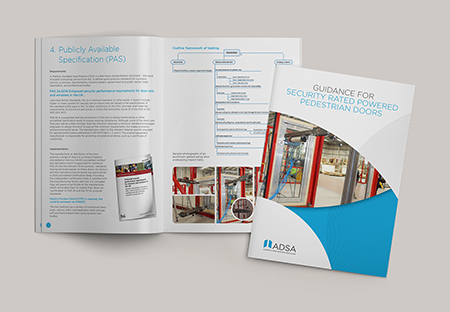An illustrated guide aimed at ironing out confusion over standards and accreditation for security rated powered pedestrian doors (PPD) has been published by the Automatic Door Suppliers Association (ADSA).
Guidance for Security Rated Powered Pedestrian Doors is a free 20-page illustrated document, which defines principal burglary resistance security standards currently used in the UK.
Available to download from ADSA’s website: www.adsa.org.uk/about-us/news/post/security-rated-ppd it outlines the scope of each standard, how they vary from each other and how they apply to exacting benchmarks such as Secured By Design – an initiative managed by UK police.
The document clarifies the range of physical attack ratings against damage, which may be caused during burglary or vandalism and outlines the levels of testing undertaken for products to achieve certification. These are depicted through diagrams and flow chart to help the reader make better sense of each standard and its processes.
It is also packed with interactive links for further reading and access to standards documentation – helping keep all related content in one place.
ADSA produced the guide after recognising confusion across the industry over the different standards. The initiative was prompted by an increasing number of enquiries to its technical support line from members and other industry professionals including architects, specifiers, building owners and facilities managers, seeking clarification on subtle differences between the likes of RC2, RC3 and LPS 1175.
Darren Hyde, ADSA’s Technical and Training Manager, said, “This publication is a useful addition to the information that we currently offer through the ADSA Academy and our training courses. It extends a level of understanding to a larger audience – not just ADSA members but those in the wider development and building management industry.
“There are a variety of standards which apply to the security of automatic doors to ensure that they meet quality standards to protect property from attempted burglary and vandalism. Some of the requirements within these standards overlap but each is intended to meet a specific criteria and this publication outlines how these apply, together with the levels of testing, which products must undergo.
“Ultimately, these standards raise the bar by ensuring our industry produces quality products that are resilient and provide peace of mind to the end user.”
For further information about ADSA membership contact: rachel@adsa.org.uk
Visit: www.adsa.org.uk

